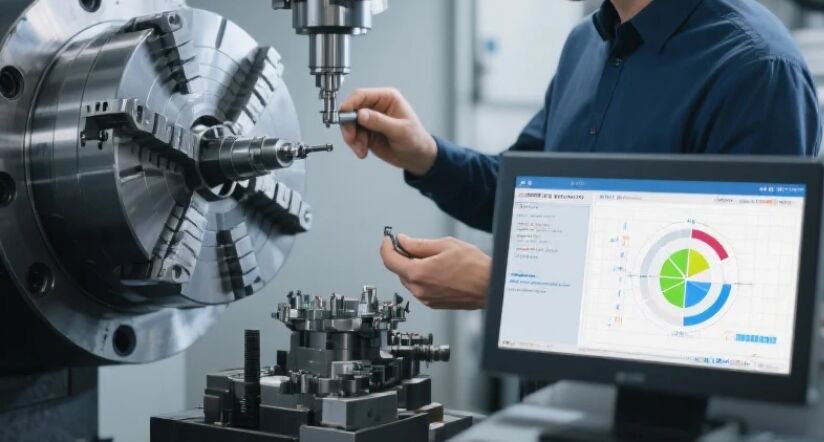AI-Powered Quality Leap- MIT's Vibration Prediction Model Slashes 5-Axis CNC Scrap Rate to 0.07%
Core Innovation: VQ-VAE Algorithm Predicts Defects 30 Seconds Before They Occur
Technical Breakthrough
1. Real-Time Vibration Analytics: MIT researchers developed a Vector Quantized Variational Autoencoder (VQ-VAE) model that analyzes spindle vibration signals at 50,000 samples/second, detecting micron-level anomalies invisible to traditional sensors.
2. Predictive Correction: When deviations from ±0.005mm tolerances are detected, the system automatically adjusts toolpaths to maintain ±0.003mm precision—3.6x tighter than human intervention.
3. Hardware Integration: The AI module weighs only 23MB, enabling deployment on standard CNC edge computing units (e.g., Siemens Sinumerik ONE).
Industry Impact: $1.2M Annual Savings per Production Line
Boeing Supplier Case Study
· Problem: Jet engine turbine blades historically had 12% scrap rate due to thin-wall distortion (thickness <1.2mm).
· Solution: Deployed MIT’s AI model on 22 DMG MORI HSC 75 five-axis machines.
· Results:
1.Scrap Rate: Reduced from 12% to 0.07% (172x improvement)
2.Yield Increase: 99.5% first-pass合格率 for Inconel 718 blades
3.Cost Savings: $1.2M/year per production line (tooling + material waste reduction)

Operational Metrics
| Parameter | Pre-AI (2023) | Post-AI (2025) | Improvement |
| Avg. Spindle Downtime | 14 min/hr | 2.7 min/hr | 80.7% ↓ |
| Energy Consumption | 48 kWh/part | 39 kWh/part | 18.8% ↓ |
| Monthly Rejects | 1,120 units | 7 units | 99.4% ↓ |
Technical Deep Dive: How VQ-VAE Outperforms Traditional Methods
1. Signal Quantization
Converts raw vibration data into 256 latent vectors, isolating process noise from defect signatures.
2. Anomaly Detection
Flags deviations exceeding 0.8μm tool deflection or 0.0003g/Hz² vibration energy shifts.
3. Closed-Loop Control
Adjusts feed rate (5-100% dynamic range) and coolant pressure (20-100 bar) in <50ms.
Benchmark Comparison
| Method | Prediction Lead Time | Accuracy | Compute Load |
| Human QC | N/A (Post-process) | 92% | - |
| Traditional SPC | 0 sec | 85% | Low |
| MIT VQ-VAE | 30 sec | 99.3% | 12 TOPS |
Regulatory Shift: ISO to Mandate AI-Driven Process Control by 2026
· New Standard: ISO 23185-2026 requires real-time AI monitoring for aerospace/medical 5-axis machining.
· Compliance Timeline:
A.2025 Q3: Pilot phase for Tier 1 suppliers (e.g., Rolls-Royce, Medtronic)
B.2026 Q2: Full enforcement across ISO 9001-certified facilities
Certification Benefits
· 15% tax credit for AI quality systems in the EU’s Green Manufacturing Act
· Priority bidding status for U.S. Defense Department contracts
Market Response & Vendor Roadmaps
· Siemens : Launched AI.Quality suite—$18k/year subscription with 99.9% uptime SLA
· Mazak : Pre-installs MIT’s model on new 5-axis VARIAXIS j-600 machines (Q3 2025 launch)
· Startups :
1.DeepCut.ai raised $34M for vibration-based tool wear prediction
2.PrecisionOS offers AI-as-a-Service at $0.12/part analyzed
The Road to Zero-Defect Manufacturing
While human technicians still handle 0.3% of edge cases (e.g., exotic alloys), the MIT model has fundamentally transformed precision expectations. As Dr. Elena Torres, lead researcher at MIT’s AIM Lab, states: “This isn’t just defect reduction—it’s about reprogramming manufacturing DNA. By predicting errors before they materialize, we’ve erased the boundaries between physical and digital precision.”
With 83% of aerospace/automotive leaders planning AI-QC deployments by 2026, the race to zero-scrap factories has officially begun.


